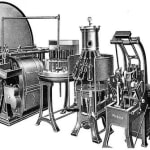 150 years ago to the day, on October 1, 1868, Carl Kappert and Louis Holstein founded the Holstein & Kappert equipment trading company in Dortmund, Germany, thus laying the foundations for KHS. It took decades, however, for the enterprise to become a worldwide manufacturer of turnkey systems - many years of expansion, fusions and, first and foremost, continuous development of products geared to the future. Today, the KHS Group is one of the market’s leading systems providers for the beverage, food and non-food industries. For years the company has increasingly focused on sustainability in the development of new plant engineering.
150 years ago to the day, on October 1, 1868, Carl Kappert and Louis Holstein founded the Holstein & Kappert equipment trading company in Dortmund, Germany, thus laying the foundations for KHS. It took decades, however, for the enterprise to become a worldwide manufacturer of turnkey systems - many years of expansion, fusions and, first and foremost, continuous development of products geared to the future. Today, the KHS Group is one of the market’s leading systems providers for the beverage, food and non-food industries. For years the company has increasingly focused on sustainability in the development of new plant engineering."150 years of entrepreneurship and ingenuity have lent KHS the image it enjoys today. They are a central theme throughout our history and form the foundations upon which we now stand," explains Burkhard Becker, chairman of the KHS Executive Management Board. Rolf Staab, executive vice-president of Human Resources for the KHS Group, also traces the success of the Dortmund systems supplier back to its roots. "Without the creativity, passion and perseverance of many generations of engineers, business personnel and factory workers our company wouldn’t have the international standing it holds today. Without them we wouldn’t enjoy the recognition our customers now show us."
Pioneers since the first hour
KHS’ rise to worldwide partner to the beverage industry was a continuous process. It all began with the foundation of the Holstein & Kappert company in 1868. The Dortmund equipment trader initially only sold technical apparatus for the beverage industry. At the beginning of the 20th century the company began producing its own machinery which washed bottles and filled and packaged beverages, among other things.The Seitz-Werke and Enzinger also celebrated their first successes in the second half of the 19th century. With the help of their innovative filters they revolutionized the wine and beer industries.
The fusion between Holstein & Kappert and Seitz Enzinger Noll Maschinenbau AG (SEN) based in Bad Kreuznach and Worms in 1993 was the ultimate milestone in the company's history. Under the umbrella of the Klöckner-Werke, majority shareholder of Holstein & Kappert since 1979, the two manufacturers merged to form KHS Maschinen- und Anlagenbau AG.
Manfred Rückstein, head of Corporate Communication at KHS from 1991 to 2012, looks back to the time after the merger, which was at first quite turbulent. "We had to make it clear to our customers, who for decades had been loyal to either the one or the other brand, that the products from Bad Kreuznach, Worms and Dortmund were now all on an even par. In order to achieve this goal, it was absolutely essential to start using uniform product names."


